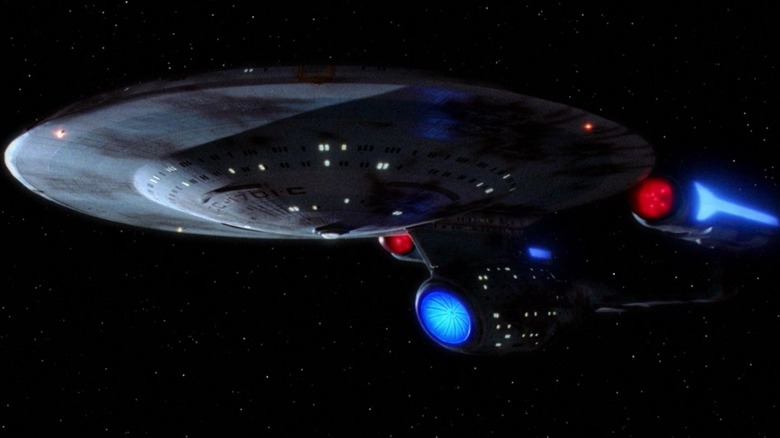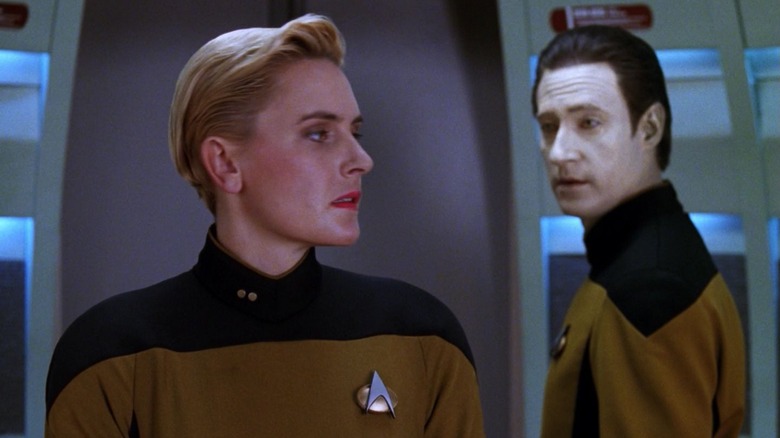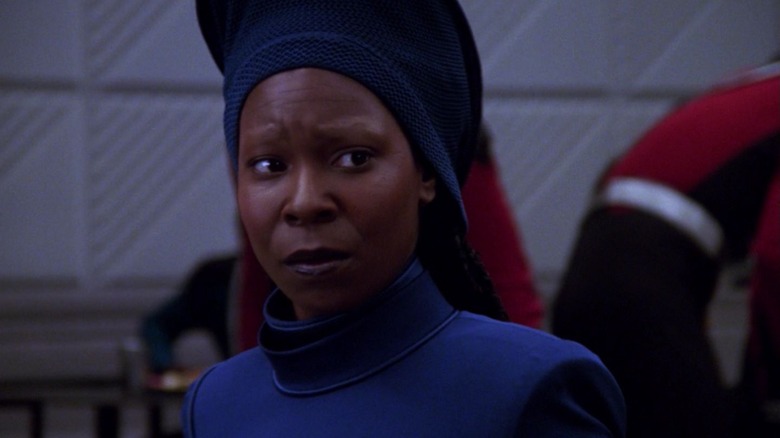One Of Star Trek: The Next Generation's Best Episodes Was Also One Of The Hardest
In the "Star Trek: The Next Generation" episode "Yesterday's Enterprise" (February 19, 1990), the Enterprise-D is flying merrily through space when it encounters a colossal negative space-wedgie in its path. They crew finds it is a portal through time, leading to a point in history 22 years in the past. A ship flies out of the portal. It's the Enterprise-C, commanded by the stalwart Rachel Garrett (Tricia O'Neill).
When it does, however, everything about the Enterprise-D's timeline shimmers and shifts. All of a sudden, the Enterprise-D is a combat ship. The crew all become weapons-toting soldiers, now embroiled in a year-long war. It seems that the Enterprise-C exited its own timeline at a crucial point in galactic history, when it was facing a losing battle at the hands of the Romulans. When it vanished into the future, the battle never ended, and a full-scale war broke out. 22 years later, the Enterprise-D is still fighting the same war.
Guinan (Whoopi Goldberg) is the only character who senses that something is amiss. She knows that the timeline shifted, and that the Enterprise-C has to return through the time portal to its own time. Captain Picard (Patrick Stewart) is reluctant to do so, as he knows the Enterprise-C will be destroyed. If it is, however, it will prevent a war from breaking out and save untold lives. "Yesterday's Enterprise" presents a clever, sci-fi version of the trolley problem.
"Yesterday's Enterprise" also features the return of Tasha Yar (Denise Crosby), a character who had died a few seasons earlier. Many consider "Yesterday's Enterprise" one of the better episodes of the series.
In the Hollywood Reporter in 2020, co-writer Ira Steven Behr talked about making the episode, and how difficult it was to bring about. It was, as one might imagine, a complicated affair.
The early drafts of Yesterday's Enterprise
It seems that "Yesterday's Enterprise" was massively reworked from its early inception. The script was one of the few that was written by outside amateurs, in this case, Trent Christopher Ganino; "Next Generation" had an open-door policy when it came to scripts, and fans were welcome to mail in their stories all they wanted. The initial script for "Yesterday's" was accepted by the then-new Michael Piller, and handed to writers Eric Stillwell and Ronald D. Moore for polish. Moore was the one who invented Rachel Garrett as a main character, and who turned the story explicitly into a time travel tale. It was then passed to Behr and other "Next Generation" writer for further fine-tuning.
The problem with the multiple rounds of script tinkering was that "Next Generation" was already being produced at a breakneck pace, needing to finish an episode every week. Ira Steven Behr described the production of "Yesterday's" as a "cluckerf***," and that the episode likely wouldn't have made it to screen if they weren't desperate to get something in production as quickly as possible. Behr said:
"What's important to understand is that we were so far behind on episodes [in season three], we were so backed up with shows, so it was just like putting out fires, you know? But there had been this story that there was interest in, from Eric Stillwell, and we needed to put something in the pipeline for production."
Behr recalled that, in order to finish the script, he, Moore, and writers Richard Manning and Hans Beimler all had to work over their Thanksgiving vacation. Behr said that "That pissed everyone off to no end. [...] But that was the job." Rough job, it seems.
The clusterf*** of Yesterday's Enterprise
It was crunch time. Production had to be moved from early 1990 back to late 1989 in order to accommodate the schedules of Goldberg and Crosby, now major parts of the story. Behr recalled that it truly was a matter of meeting a strict deadline, and needing to do piles and piles of work very quickly. Shooting was going to start on December 11, and it was Turkey Day already. As Behr recalled:
"Michael [Piller], at the time, was not able to — or didn't want to — deal with the writing staff on a day-to-day basis, for something like this. He was, justifiably, too busy rewriting and dealing with everything else, because we were so behind that season. It was such a clusterf***. He said: 'Get them in, we gotta do this.'"
Moore came up with a lot of the major changes in the script. He wrote the opening scene wherein Guinan and Worf (Michael Dorn) have a conversation in Ten Forward before the timeline rigmarole begins, as well as the final scene wherein the Enterprise-D blows up protecting the Enterprise-C (a scene, incidentally, that executive producer Rick Berman objected to). Piller wrote the scenes between Guinan and Picard. Behr was ultimately impressed with the final product, saying that "It was all hands on deck, but out of that chaos came kind of a [...] cultural touchstone, I guess, in terms of the genre."
Moore recalled in the same Hollywood Reporter piece that "Yesterday's Enterprise" came together so well, that it boosted morale among the "Next Generation" staff. Everyone was overworked and tired, but this episode actually ended up working, and everyone came to love the way it turned out.


